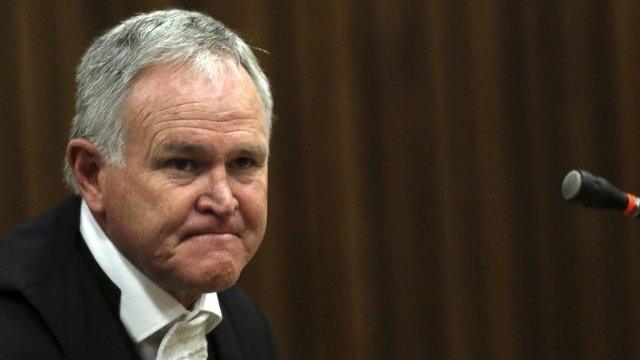Pistorius told 'snowball of lies,' says prosecution
- Published
Oscar Pistorius trial - 7 August - in 60 seconds
The main prosecutor in the trial of Oscar Pistorius has argued that the South African athlete cannot avoid a conviction for murdering his girlfriend.
Gerrie Nel accused the athlete of being a "deceitful witness" who told the court a "snowball of lies".
Mr Pistorius denies murdering his girlfriend Reeva Steenkamp.
He says he mistook her for an intruder but the prosecution says he deliberately shot her after a row.
Prosecutor Gerrie Nel made his concluding remarks on Thursday, with the defence due to follow on Friday.
Known as the "Pitbull" prosecutor, Mr Nel said that even if Mr Pistorius' account of events were true, "he cannot escape" a conviction for murdering with intent.
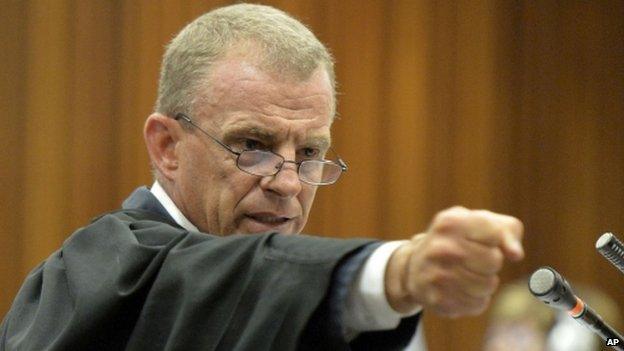
Prosecutor Gerrie Nel went on the offensive once again as he made his closing arguments
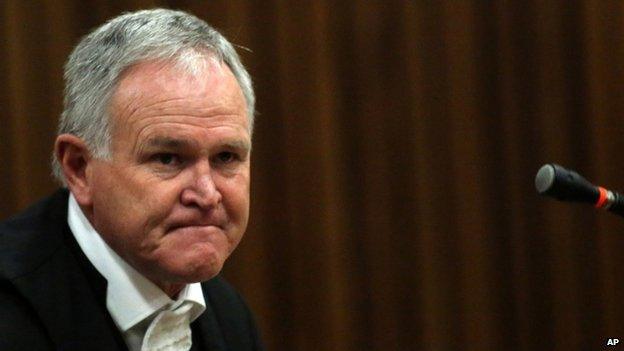
Oscar Pistorius' lawyer, Barry Roux, is expected to present his concluding remarks on Friday
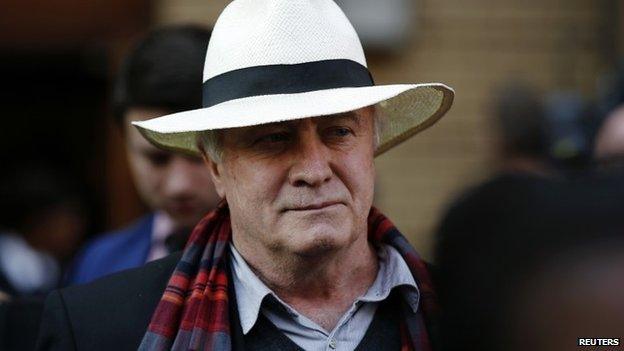
Oscar Pistorius' estranged father Henke appeared at court for the first time to hear the summary at the trial
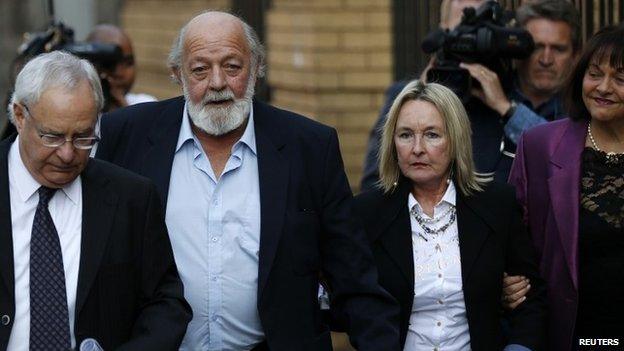
It was also the first time that Barry Steenkamp, Reeva's father, appeared at the court in Pretoria
Ms Steenkamp was killed at Mr Pistorius' home in South Africa's capital, Pretoria, on 14 February last year.
Mr Pistorius' estranged father, Henke, was in the packed courtroom for the first time during the trial. It was also the first time that Barry Steenkamp, Reeva's father, had attended.
'Devoid of truth'
At the court in Pretoria, Mr Nel accused the athlete's lawyers of presenting two lines of defence that "can never be reconciled".
Mr Pistorius said he had fired both involuntarily and also out of fear, Mr Nel argued, insisting the court had to choose only one of his defences.
He said the court "should have no difficulty in rejecting" the athlete's version of events because it was "devoid of any truth".
Mr Pistorius told so many lies in such a short space of time, Mr Nel said, that they had had a "snowball effect" and forced him to tell more.
He also attacked Mr Pistorius for presenting himself as "a victim of circumstance".
But Mr Nel said the athlete had anxiety "on call", suggesting that he had manufactured a fear of crime to help his defence.

Analysis: Pumza Fihlani, BBC News, Pretoria
Prosecutor Gerrie Nel, known in court circles as the "bull terrier", has spent the day giving a detailed summary of the instances Oscar Pistorius has altered his statements during the trial. He pointed to the athlete's defences as a clear indication that he was covering up for shooting his girlfriend after an argument on Valentine's Day last year.
In his bail statement, Mr Pistorius said he had pulled the trigger to protect the couple from a perceived intruder. Mr Nel, who referred to the athlete's evidence as a "snowball of lies", used this to argue that even by this version he should be found guilty of murder with intent as he was aware of the likely outcome of his actions having armed himself with the sole purpose of shooting whoever was behind the toilet door.
The Paralympian, dressed in a dark suit, sat listening to Mr Nel intently.

Mr Pistorius' defence team led by top lawyer Barry Roux has sought to present the athlete as a vulnerable individual.
Mr Roux argued that the athlete's disability had fostered a "heightened fight response" to compensate for not being able-bodied, and that his insecurities led him to confront danger.
Responding to Mr Nel's concluding remarks, the defence lawyer said that the state's case rested on circumstantial evidence that could not be relied upon in absolute terms: "If your case is based on circumstantial evidence, which is the state's case, then you need two things.
"One, you must show that the proven facts only justify one inference and that it excludes all other reasonable inferences. We're not talking about fanciful inferences, all other reasonable inferences. It must exclude that it was not an argument. It must exclude the first shots. It must ignore it, in the state's case."
Showdown
The BBC's Karen Allen in Pretoria says Mr Nel sought to build a picture of a man who knew the consequences of his actions.
Last month, a psychiatric report said Mr Pistorius had post-traumatic stress disorder but no mental illness that could prevent him being held criminally responsible for his actions.
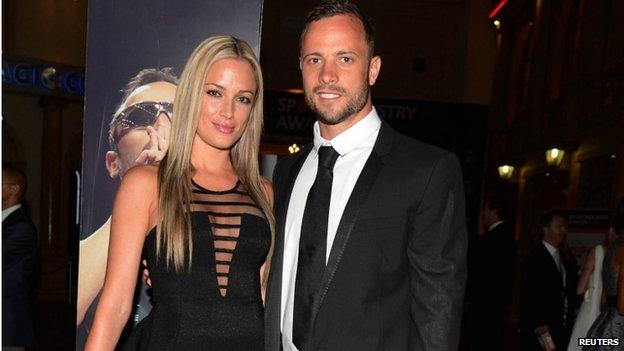
Mr Pistorius and his girlfriend Reeva Steenkamp had been dating for three months before the fatal shooting
Judge Masipa is expected to adjourn the trial after hearing the arguments to consider her ruling, a process that analysts say will take in between a week to a month.
There is no jury.
If found guilty of murder, the 27-year-old, who went on trial on 3 March, could face life imprisonment.
If he is acquitted of that charge, the court will consider an alternative charge of culpable homicide, for which he could - if convicted - receive about 15 years in prison.
-
×
-
1. Balcony
×
Mr Pistorius said in his statement at the start of the trial that he woke in the early hours and walked on his stumps to the balcony, pulled in two fans, closed the sliding door and drew curtains. He said that shortly before he had spoken to Reeva, who was in bed beside him.
He said he rejected prosecution claims that a witness heard arguing coming from the house before the shooting.
-
2. Bathroom window
×Mr Pistorius said he heard the bathroom window sliding open and believed that an intruder, or intruders, had entered the bathroom through a window which was not fitted with burglar bars.
"Unbeknown to me, Reeva must have gone to the toilet in the bathroom at the time I brought in the fans," he said.
Mr Pistorius said he approached the bathroom armed with his firearm, to defend himself and his girlfriend, believing Ms Steenkamp was still in bed.
-
3. Shooting
×Both sides agree four bullets were fired. Ms Steenkamp was hit three times.
Mr Pistorius said he fired his weapon after hearing a noise in the toilet which he thought was the intruder coming out of the toilet to attack him and Ms Steenkamp.
He said he was in a fearful state, knowing he was on his stumps and unable to run away or properly defend himself.
Mr Pistorius said he rejected claims that he was on his prostheses when he shot at the door.
A witness told the trial she woke to hear a woman screaming and a man shouting for help. She said that after the screams she heard four shots.
-
4. Bedroom
×Mr Pistorius said he went back to the bedroom after shooting at the toilet door, still shouting for Reeva. Lifting himself up onto the bed, he felt over to the right hand side of it and noticed Ms Steenkamp was not there.
Mr Pistorius said this was when he realised she could have been in the toilet.
-
5. Toilet door
×Mr Pistorius said he went back to the bathroom but the toilet was locked, so he returned to the bedroom, pulled on his prosthetic legs, turned on the lights before bashing in the toilet door with a cricket bat.
Forensics expert Johannes Vermeulen told the court that the height of the marks on the door caused by the cricket bat suggest Mr Pistorius was on his stumps at the time.
-
6. Emergency calls
×Mr Pistorius's defence team say he then called security at the gated housing complex and a private paramedic service before carrying Ms Steenkamp downstairs.
A security guard claimed it was the other way round, and he had called Mr Pistorius first after reports of gunfire. However, phone records shown to the court revealed Mr Pistorius called the estate manager at 3:19am, a minute later he called the ambulance service and at 3:21am he called estate security.
A minute later he received an incoming call - estate security calling him back.
According to police phone expert Francois Moller, Mr Pistorius called his friend Justin Divaris a short time later and just after 4:00am he called his brother Carl.
- Published7 August 2014
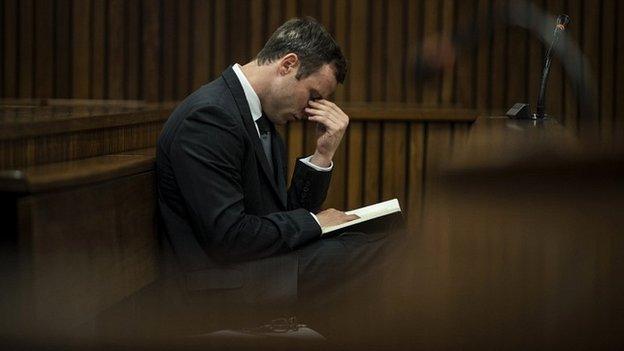
- Published7 August 2014
